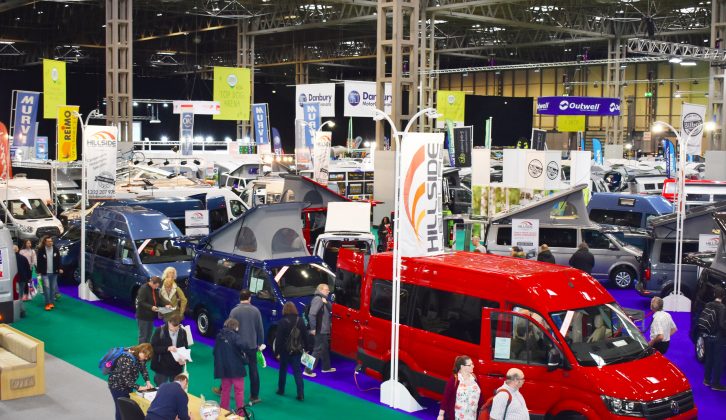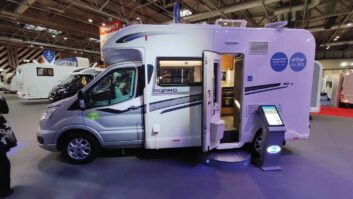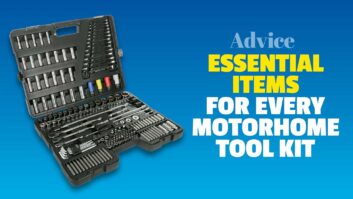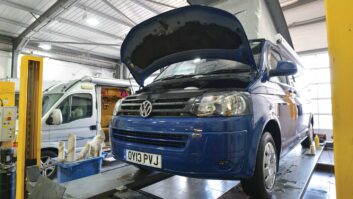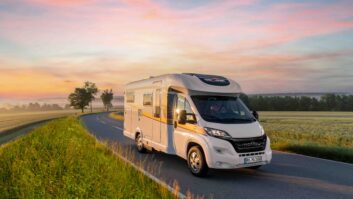There’s no doubt about it, going to a motorhome show is a wonderful way to view any number of motorhomes together – perfect for instant comparisons.
But, should you go on to actually buy one?
Here’s our advice to help you buy your next – or your first – motorhome with confidence.
What kind of show?
There’s a huge choice of shows taking place every year, from huge indoor events to outdoor exhibitions, to a dealer’s own open weekends, and more.
The UK’s largest showcase for new-model motorhomes takes place each October at the NEC Birmingham, the Motorhome and Caravan Show.
Order a vehicle from here and there’s every chance it’ll be in your hands in time for the traditional start of the touring season – Easter.
In addition, there is a second NEC extravaganza every February, the Caravan, Camping and Motorhome Show.
There are plenty of other motorhome shows taking place throughout the year – indoors and out. At the latter, you’ll get the chance to view pre-owned models from dealers’ stocks, too.
Do your pre-show research
Actually, your work should have started before you attend any show.
Collect brochures. Read the reviews in Practical Motorhome – in the magazine and on our website.
Go online and see what folk have to say (take extreme views – good and bad – with the proverbial pinch of salt), and talk to friends (or friends of friends) who already own motorhomes.
Quite simply, gather information from as many sources as possible.
The Practical Motorhome Buyer’s Guide – published in the magazine – is a great resource, giving basic details on hundreds of models, with floorplan references so you can take that important first step in deciding what layout suits you best.
Decide on a budget. And hold a bit back for the inevitable extra costs post-purchase – typically, for any items of equipment you subsequently decide are vital.
At this stage, too, you should start narrowing down the shortlist of models you want to see at any particular event to a manageable size.
Needless to add, do check ahead to ascertain whether the models you want to see will actually be on display at the show you’re planning to visit.
Get organised
A bit of planning ahead will prove a massive help on your day(s) out at any show, too.
Even walking around an event can be energy-sapping (here’s a tip: dress for comfort, including a sensible choice of footwear).
Get a show floorplan and plot a route around the show, highlighting which stands you want to visit in particular, so you don’t miss any.
Give yourselves plenty of time, though! You might bump into friends or existing motorhome owners (again, potentially a great source of advice), or you may just like the idea of an occasional sit-down.
By all means use your phone to photograph and/or video any motorhomes you particularly like the look of (you might even want to record your own thoughts at the same time).
But, there’s no substitute for physically writing down the make and exact model details, and what you like and dislike about each model – with so many ’vans to take in, they can all blur into one.
Work out what you want
A list of your expectations is another great starting point.
There is a potentially overwhelming amount of choice out there, and what ’van works for you and how you tour is a personal decision that only you can make.
Include anything from overall dimensions and internal layout, to your preferred base vehicle, the MTPLM and specific options.
Deciding which features are must-have items and which are ‘just’ desirable will refine your thinking and help you identify the models that are right for you.
When looking round ’vans, take time to see how different layouts will work for you.
Everything might look snazzy and shiny under the bright lights of a motorhome show, but will it really work for you on tour?
Are the beds long enough? How easy are they to make up? Can you clamber into that drop-down double? Is there enough headroom in the shower?
Can you reach the overhead lockers? Is this soft-furnishings scheme right? This is your opportunity to find out!
Take the time you need to get it right
Remember, sales folk are under pressure to sell vehicles at shows. Their bosses have often paid large amounts of money to have a presence at such events.
But that doesn’t mean you have to make a decision right there, on the spot. Take time to consider if this is the right motorhome and the right deal for you.
Buying a new ’van is a large financial investment and the holiday accommodation that you hope will make your touring dreams come true.
Is this the make, model, layout and floorplan you want? Is the dealer near where you live for servicing and in case any work needs doing? It has to be right for you.
On the plus side, though, there should be plenty of attractive show-only offers to take advantage of…
Here’s our handy 10-point plan to help make your motorhome purchasing experience a happy one.
1 – Take your time
Use any show you attend as an ideal research facility.
Don’t feel under any pressure to buy. If a deal looks too good to be true, it probably is!
2 – Your best friend, the salesperson?
It’s always best to deal with a dealer you know. Stands at shows are staffed by representatives from dealers across the whole country. They are obliged tell you where they are based.
But, it’s not worth venturing into the unknown. Make visiting the actual premises of a dealer you’re proposing to buy from an absolute must. You don’t want any nasty surprises!
3 – Don’t be afraid to ask questions
At any show, even if you think you recognise a dealership’s name, it’s time to turn detective to ascertain things like:
- Where are you from? How long has your company been established under that name?
- Do you work there full-time, and in what capacity?
- How long have you worked here?
- What facilities do you have on your premises (workshops, safe overnight storage etc)?
- What’s the name of your nearest campsite? (Also handy to know if you’re visiting a dealership and want somewhere to stop overnight.)
And never be scared to ask a question – nothing is too basic! And if you forget to ask something, go back.
You’re spending a large chunk of your hard-earned cash on a motorhome, you don’t want to walk away with niggling doubts or worries.
4 – Check product knowledge
Do sales staff know what they are selling? Some dealers employ professional sellers just for the duration of a show.
Often a key indicator is if a salesperson doesn’t seem to know much about the product he/she is selling or is reluctant to offer any kind of demonstration (for example, how seats convert to beds).
You can always use an old lawyer’s trick, too: ask a question that you already know the answer to.
5 – It’s not all about price
Think value, not price.
Consider aspects such as the cost in terms of fuel as well as the time taken to visit a dealer a long way from your home.
If you’re close to hammering out a deal, it’s always worth asking for a final sweetener – an additional item of equipment (bike rack, awning, gas cylinder or similar, but only if that’s what you really want) or a free service.
Simply haggle on price and there’s every chance it’s the professional salesperson that will win!
6 – Think of the all-round service
Despite what you might hear – and unlike, say, cars – there is little in the way of national warranty schemes for motorhomes.
That’s purely down to market size – dealers will, naturally, put their own customers ahead of others when it comes to aftersales.
That’s why our advice is to buy from a dealer you trust who’s local to you (or, alternatively, is near where you regularly travel across the country).
Note, also, when you buy a motorhome your contract is with your supplying dealer, who is expected to organise your servicing, including any warranty work.
7 – Seek approvals
Ideally, your chosen retailer will be an Approved Dealer and/or operate its servicing under the Approved Workshop scheme – as administered by trade body the NCC (National Caravan Council).
Most important of all, does a dealership get your personal approval?
8 – Trading in?
Things can get slightly trickier if you’re trading in your existing motorhome (many dealers will take other vehicles – including cars, caravans, even boats and more), especially at a show where there’s no opportunity to see your current ’van (images and key servicing documentation can help here).
Again, a good dealer will always ask the right questions about service records, amount of usage etc (it’s even better if the dealer already knows your ’van, of course, that way you’ll get the most accurate trade-in evaluation).
Beware those offering high prices for your ’van at the show, only to have it knocked down when you arrive to do a part-exchange.
9 – Get it all on paper
If you are offered any deal at a show, especially one involving a part-exchange, make sure you get as much as possible in writing.
10 – Prices will go up?
It’s not unusual for a manufacturer to increase its prices after a major show.
You might want to build that into your thoughts and make sure any future sales agreements factor this in.
When looking round ’vans, take time to see how different layouts will work for you
